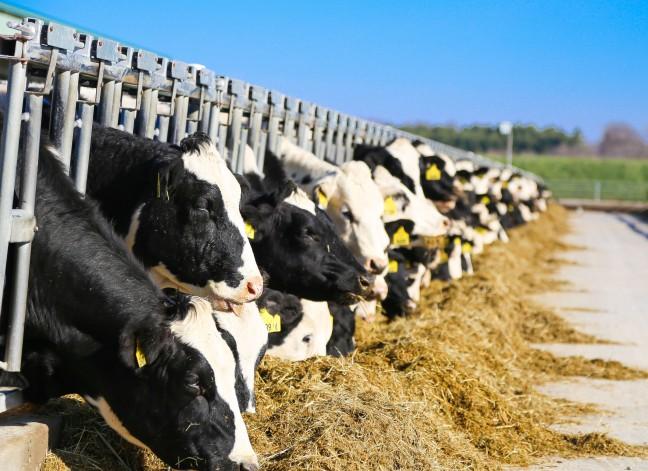The University of Wisconsin placed first at the 2018 North American Intercollegiate Dairy Challenge in April, beating out teams from 38 American and Canadian universities.
Team members Anthony Schmitz, Charles Hamilton, Longan Voigts and Connor Willems were students in the Dairy Science Department at UW and graduated this past spring. Coaches Ted Halbach and David Combs of the Department of Dairy Science led the team to victory in California.
The Dairy Challenge is a three-day applied dairy management competition that requires students to analyze a commercial farm and present their observations and management recommendations to a panel of industry professionals, Halbach said. Judges decide the winner based on the quality of a team’s analysis and solutions.
Dairy experts hope tasty, healthy, UW invention could ease dairy crisis
Halbach said one of the obstacles was the time constraint on identifying issues occurring on the farm and the reasons behind them.
Another obstacle was that all team members had to have a full understanding of their plan, Schmitz said. Although he was primarily responsible for financial analysis, he also had to understand nutrition, reproduction, genetics and other topics.
“Dairy Science includes both applied and basic science applications,” Halbach said. “They also learn how to communicate their expertise [through the Dairy Challenge].”
To test the entire team’s knowledge, the panel asked Schmitz not to answer the financial questions to see if everyone else knew the concepts too, Schmitz said.
Schmitz said the best part of the Dairy Challenge was that he had a chance to apply what he had learned in school on a real farm. Schmitz and his teammates strengthened their communication and interpersonal skills through analyzing, pitching and selling their ideas, he said.
“We had high expectation with the hard work we put in,” Schmitz said. “We learned how to interact with people and put textbooks into action.”
The Dairy Challenge is a platform used to examine how the UW Dairy Science Department’s core courses, practical active learning labs and internship opportunities prepare students for employment, Halbach said. He believes the problem-solving and dairy knowledge skills that led the team to success at the Dairy Challenge will also lead them to rewarding careers.
According to the department’s website, UW Dairy Science is renowned for its excellent teaching, research and outreach on dairy. The department has between 70 to 80 undergraduate students, with about 25 incoming students each year, Cathy Rook, the Dairy Science Student Coordinator said.
The department also has a Visiting International Student Program that provides full academic and student support services to international students who want to pursue a dairy science degree. But even though there have been some inquiries and students who qualified, there have not yet been any admissions, Rook said.
Additionally, the program allows for students to gain hands-on experience to provide for an economic dependency on dairy in Wisconsin.
To provide that hands-on experience, the department supplies access to cows during all lab and practical sessions, Halbach said.
“There are considerable student opportunities associated with going to school in the heart of ‘America’s Dairyland’ with World Dairy Expo virtually in our backyard,” Halbach said.
The World Dairy Expo is a five-day event held every year at the Alliant Energy Center in Madison. It showcases dairy cattle and new technology available to the industry.
In photos: Farmers, cheese-lovers attend annual World Dairy Expo
UW utilizes many strategies to train students for real work in the dairy field, an industry that plays a large role in Wisconsin’s economy, Halbach said.
In 2014, a study was conducted to assess the dairy industry in Wisconsin. It found milk production and dairy product manufacturing in the state generated $40 billion within the year.
The industry contributes $43.4 billion to the state’s economy each year and employs more than 78,900 people, while Wisconsin’s 1.27 million dairy cows generate $34,000 each in annual economic activity, according to the Dairy Farmers of Wisconsin website.
Gov. Scott Walker recently visited and awarded the Center for Dairy Research at UW with a $200,000 state grant from the Wisconsin Economic Development Corporation. The grant aims to support innovative dairy technologies and products, and promote entrepreneurship within the state’s dairy industry.
Besides helping with problem-solving and product development within CDR, the grant will also help keep the processing sector of the state competitive, Stephenson said.
CDR launched the Tech Transfer, University, Research and Business Opportunity program in 2013, which has created 29 jobs since then in rural communities.
As for the Dairy Challenge, UW coaches expressed pride not only in the team’s victory, but also in everything they did to achieve it.
“Dave and I are privileged to work with extremely talented students,” Halbach said. “This team did the little things when no one was watching. That leads to success.”













